
Montessori Education is an innovative approach to learning that emphasizes child-led exploration and discovery. Developed by Dr. Maria Montessori in the early 20th century, this educational philosophy advocates for a learning environment that fosters independence, respect, and a love for learning. The principles of Montessori Education have resonated with educators and parents worldwide, highlighting a profound shift from traditional teaching methods to a more holistic and individualized approach to education.
Principles of Montessori Education
At the heart of Montessori Education are several core principles that define its unique approach. One of the most significant is the idea of child-led learning. In a Montessori classroom, children are encouraged to choose their activities and explore subjects that ignite their curiosity. This autonomy fosters a sense of ownership over their learning process, allowing children to engage with materials and concepts at their own pace.
Another key principle is the prepared environment. Montessori classrooms are specifically designed to support exploration and discovery. Materials are organized and accessible, inviting children to interact with them freely. Educators, known as guides or facilitators, observe and support rather than direct, allowing children to learn through experience rather than rote memorization.
The role of the educator in Montessori Education is pivotal. Instead of being the primary source of knowledge, the educator acts as a facilitator who creates a nurturing environment. They encourage children to ask questions, explore solutions, and develop critical thinking skills. This shift in the educator’s role empowers children to take charge of their learning journey, cultivating self-motivation and resilience.
Benefits of Montessori Learning
The benefits of Montessori learning extend far beyond the classroom. One of the most notable advantages is the promotion of independence. Children in Montessori classrooms learn to make choices, set goals, and manage their time effectively. This independence builds confidence and equips them with essential life skills that are invaluable in their academic and personal lives.
Moreover, Montessori Education fosters critical thinking and problem-solving abilities. By engaging with hands-on materials and real-world scenarios, children learn to approach challenges creatively and think analytically. This skill set is essential in navigating the complexities of life and is increasingly important in a rapidly changing world.
Social skills also thrive in a Montessori environment. Mixed-age classrooms encourage collaboration and peer learning, allowing children to develop empathy, communication, and teamwork skills. As they interact with peers of varying ages, they not only learn from each other but also become mentors and role models, reinforcing their understanding of community and cooperation.
Differences Between Montessori and Traditional Education
While both Montessori and traditional education aim to educate children, their philosophies and methods differ significantly. Traditional education often follows a teacher-centered approach, where the educator delivers information and students are expected to absorb it through structured lessons. In contrast, Montessori methods prioritize the child’s natural curiosity and desire to learn, allowing for a more organic exploration of topics.
Assessment methods also vary. Traditional education typically relies on standardized testing to measure student progress, while Montessori Education focuses on individual development and mastery of concepts over time. This individualized assessment helps educators understand a child’s unique learning style and adjust their approach accordingly.
Furthermore, the physical environment plays a crucial role in the differences between these two approaches. While traditional classrooms can be rigid and formal, Montessori classrooms are designed to be inviting and child-friendly, filled with materials that promote hands-on learning and self-discovery.
In conclusion, Montessori Education offers a refreshing alternative to traditional educational methods by emphasizing child-led learning, independence, and critical thinking. Its principles create an enriching environment that nurtures the whole child, preparing them not just academically but also socially and emotionally for the future. For those interested in exploring this educational philosophy, a variety of resources are available, including schools that implement Montessori methods. For further information about Montessori practices, you can visit Chrysalis Preschool, which provides insights into this transformative educational approach.
